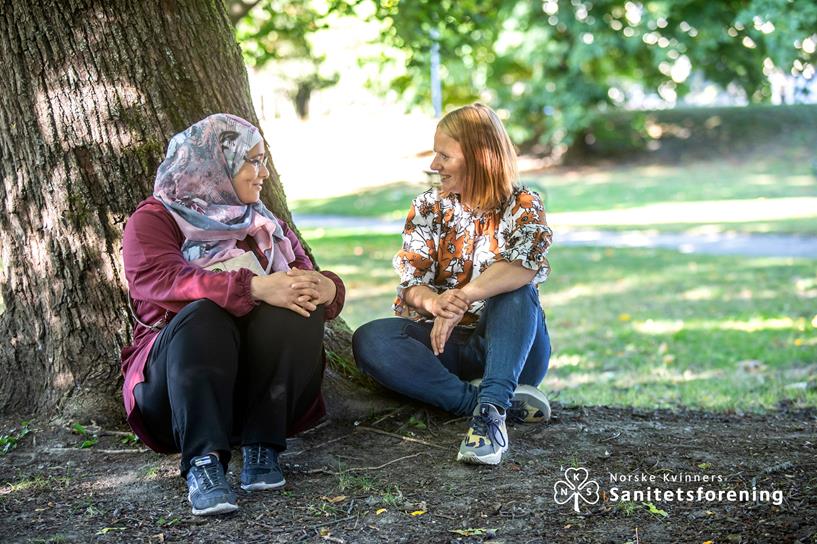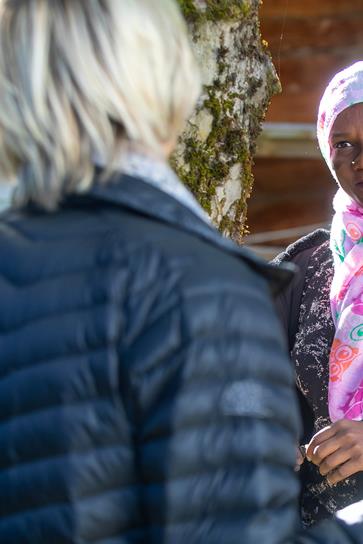Språkvenn (language friend) – a meeting place that helps integration
Språkvenn is the most important initiative of the Norwegian Women’s Public Health Association (N.K.S) to promote integration. In local associations across the country, women meet to speak Norwegian together and exchange experiences and knowledge.
Challenge
Language is the key to participating in working life and being an active citizen. At the same time, there may be limited opportunities to practise Norwegian and be active outside the home.
Poor health can be a barrier to finding work.
Loss of identity due to migration, and a limited knowledge of how one’s resources/expertise can be attractive to an employer in Norway, can be obstacles in the individual’s integration process.
Initiative
Språkvenn is a social arena where women use the Norwegian language and are involved in resource-mobilising activities together in a female community.
At the Språkvenn meetings, the participants receive health information and practise simple, everyday Norwegian discussing health and other topics.
Result
Taking part in conversations and being involved in resource-mobilising activities together strengthens the women’s Norwegian language skills, self-esteem and helps them of trust and belonging.
Conversations about health strengthen the participants’ health competence.


Objective and target group
The target group is women with an immigrant background. The objective is to contribute to helping build trust, a sense of belonging and participation through the use of the Norwegian language in connection with activities and conversations.
About the initiative
To promote integration and contribute to better health, the Norwegian Women’s Public Health Association (N.K.S) helps local associations across the country to have activities and projects that include immigrant women. At the end of 2019, 65 local associations were running Språkvenn.
Språkvenn activities are low-threshold services adapted to local conditions and reflect the wishes and needs of the participants. The activities are based on the women’s resources and interests so that they can use their abilities while at the same time learning Norwegian and building networks. These activities can be anything from cooking classes to swimming lessons, knitting evenings, theme classes, pure language training, tea and game nights, etc.
Participants are mainly recruited through cooperation between the introduction centre in the municipality and other NGOs. N.K.S. centrally supports and strengthens the local association’s Språkvenn work in several ways:
- Have prepared a guide in the use of the Språkvenn handbook and integration activities.
- Develop materials that address key topics for N.K.S.’ integration activities (women’s health, boundary setting, resource mobilisation, etc.).
- Visit local associations and provide information and guidance directly to volunteers locally.
- Answer telephone and email inquiries about Språkvenn, etc.
- Operate the resource website with an ideas bank, etc. Local associations can find the Språkvenn handbook here with suggestions for topics and activities for their groups.
- Organise meetings and seminars nationally, regionally and locally to share experiences and knowledge. Gatherings to share experiences and supplementary training and inspiration are highlighted as very important.
- Inform about Språkvenn through the member magazine “Fredrikke”.
- A separate brochure about N.K.S in general, and Språkvenn in particular, has been translated into English, Arabic, Polish, Tigrinya, Somali and Russian and is passed on to the target groups.
- Meetings of the Secretariat on diversity in the organisation help to strengthen this perspective in everything N.K.S. does.
- Cooperate with other NGOs to inform and recruit immigrant women to Språkvenn.
The social aspect of Språkvenn is important and encourages volunteers and participants to participate. Photo: Per Åge Eriksen.
Organisation and economy
N.K.S. receives funding from IMDi to run Språkvenn. The funds are used on wages, seminar activities, travel costs, development of information materials, etc. Språkvenn is offered locally but is based centrally with personnel and through strategy and management documents. For many, a female community is a familiar and safe arena. Our topics are useful and stimulating and many people dare to speak. Photo: Per Åge Eriksen.
Result
The women learn Norwegian at the same time as being involved in activities outside the home and expand their social network. This is also health-promoting, strengthens the female community and helps the women feel secure, have a sense of belonging and quality of life, which in turn can help them when applying for jobs. Språkvenn is also an important source of information through informal conversations. The women find about things that are happening and can ask about things they might be wondering about. They learn social codes and gain a greater understanding of women’s everyday lives, social relations, etc., in Norway. Not least, the women receive information about mammography and cervical screening programmes, etc., which strengthen their ability to take care of their body and health.
IMDi’s assessment
IMDi finds that Språkvenn works as intended as an initiative that stimulates fellowship, trust and belonging to the local community among immigrants and the rest of the population.
Literature on NGOs often refers to the American political scientist Robert Putnam, who distinguishes between two forms of social capital: bonding and bridging.
- IMDi finds that the grant scheme and N.K.S’ integration activities build trust through bonding and bridging. Through Språkvenn, women meet other women in the same situation and they bond. At the same time, they meet women from Norwegian backgrounds with other experiences than themselves and bridges are built between the known and the unknown. Språkvenn is a meeting place between people who would otherwise not associate with each other and it can help to build common norms and networks across more homogeneous groups. According to Putnam’s logic, this will create general trust and enable a more heterogeneous group to develop common goals and act collectively.
- Trust is an important prerequisite for participation and integration.
- The social capital that trust and unity constitute is an asset to society as a whole.
- A society with an increased level of trust and unity can contribute to increasing immigrants’ participation in working life and society, e.g., by reducing discrimination in the labour market.
About the assessment
IMDi’s quality assurance of best practice has been based on systematic assessments according to given criteria.
The criteria are:
- Result – what result does the practice produce?
- Descriptions – is the practice well described?
- Economy – what resources are required to implement the practice?
- Transferability – is it possible to implement the practice elsewhere?
The perspective on knowledge-based practice forms the basis for IMDI’s best practice work. It means that practices are assessed based on: Research-based knowledge, experience-based knowledge and user knowledge.
IMDi’s work on best practice is based on Rambøll’s report Model for identification and dissemination of best practice
Links
Språkvenn | Norwegian Women’s Public Health Association
Contact details
Name: Anniken Schwamborn
Position and place of work: Senior Adviser Integration and Diversity
Tel.: +47 98 45 56 28
Email: anniken.schwamborn@sanitetskvinnene.no